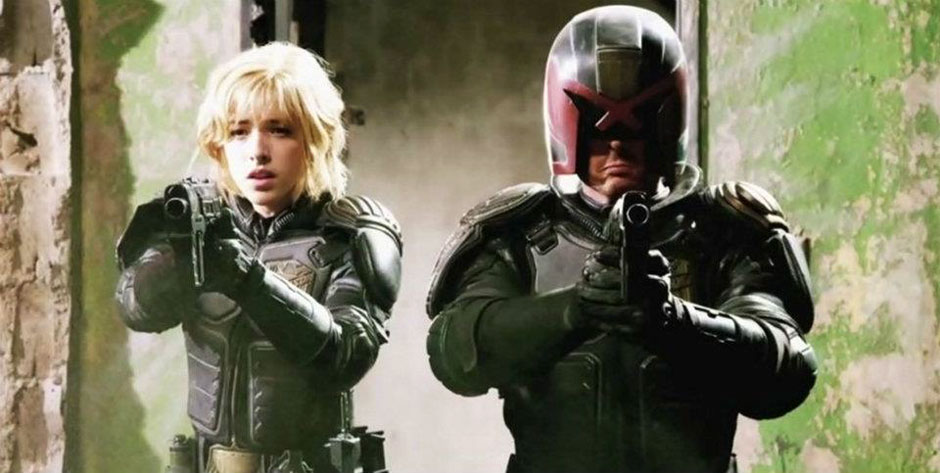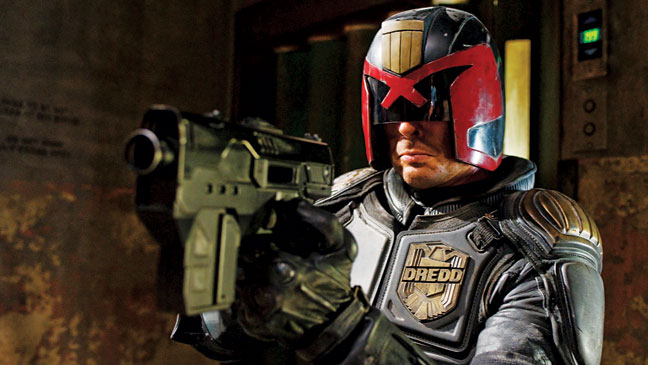|
In the
future, a violent city known as 'Mega-City One' is in disarray due to
the
number of criminals and lowlifes that rule its streets. Combating their
influence are the 'Judges', futuristic police who control crime faster
by
acting as the judge, jury and executioner at the scene of an incident.
The best
of these judges is Judge Dredd (Karl Urban), a super cop who never
removes his
helmet and isn't afraid to pull the trigger. Dredd is paired up with a
rookie
named Anderson (Olivia Thirlby), who wasn't able to pass her first test
but is
being considered as a Judge because she is actually a mutant with
psychic
powers. She can be used to anticipate what baddies are going to do or
to steal
important information from their minds. Together, Dredd and Anderson
investigate a homicide case where some bodies have been thrown down
from a
tower block called Peach Trees. One of the first criminals the Judges
pick up
is Kay (Wood Harris) and they try escort him out of the building for
interrogation. However, this is overseen by the crime boss Ma-Ma (Lena
Headey),
who opts to have the building locked down, trapping the Judges and Kay
inside
because she doesn't want her narcotics operation and her SLO-MO drugs
uncovered. By using a variety of different weapons and gadgets, Dredd
and
Anderson work through the building to take down Ma-Ma and her heavily
armed
goons.

Dredd (3D) lacks the
sophistication to problematise the
synonymous material of its comic book source, opting to be loud, ugly
and super
violent, without a definitive reason for its existence. It's a film
that looks
to extend upon Hollywood's plethora of comic book adaptations, the
highly
bankable but increasingly laboured subgenre, which presses the
politically
conservative view that one person can save the world. The very best
comic book
films though have also been forged with a moral compass, addressing
ideas of
justice and vigilantism (The Dark Knight,
2008), or appropriated to capture the euphoric personality and energy
levels of
various zany heroes (Iron Man, the Spider-Man
films). Dredd, directed by Pete Travis, is the second
attempt to adapt the
character Judge Dredd from the 2000 AD comic book, and it's not only
well short
of the aforementioned movies but also the Sylvester Stallone misfire.
The 1995
movie is not particularly impressive, and apparently, not entirely true
to the
comics either. But critically, it was willing to challenge the meaning of justice. Dredd was deeply
inscribed in the law, until he was convicted of something he knew he
didn't do.
Does that mean the law can be wrong
one percent of the time? Forwarding seventeen years later, and the same
questions of authoritarianism and fascism
are diluted by Dredd's reliance on special effects and
shootouts.
After a brief opening, the remainder of the film largely takes place in
one
setting for the entire movie. It's a very different look and feel to
the
original movie, highly atmospheric and gory, but not appropriate for
younger
children. The world, including this block, is defined by dark, gritty
urban
slums, where the effects of violence and drugs are publicly displayed.
The
corniness and cheese of the Stallone film is replaced by moroseness and
nihilism so Dredd can posture as
being mature or 'adult,' when
really it isn't.

The
film's narrative is dully reduced to a series of gunfights, which means
that
there is no time spent on critiquing Dredd's methods of authority. He's
a
faceless, witless killing machine that spouts lines like "She's guilty
and
we're Judges," and "Its judgement time". This is apparently what
the character is like in the comics, as insipid as I found it, but the
film
doesn't make enough of a point of it. The comic's social criticism is
deeply
weakened by Travis's insistence on celebrating
the violence so that the film becomes the very issue it's
supposed to be
addressing: it's a fascist movie, solely interested in seeing its
tattooed, scar-riddled baddies mowed down, one level after another. Anderson is
supposed
to represent an alternate, pragmatic form of policing, which sees Dredd
taser
two young kids pointing guns instead of killing them, and her letting a
computer whiz go after reading his mind to steal a code. But miniscule
events
like this have the impossible task of competing with huge set pieces
that
simply romanticise Dredd's brutality.
The film's narcotics thread for example, exists only to justify the
inclusion
of gratuitous amounts of slow-motion effects. We have to endure
close-ups of
bullets breaking through the skin of a man's cheek or a baddie being
thrown out
of a window by Dredd, as they glide to their death. Is there any point
other
than to pander to the video game fans that might actually be too young
to watch
this anyway? As a character, Dredd has been compared to Dirty Harry
Callahan. The
difference is this though: the big guy fought against an unfair justice
system that
let guilty criminals walk free and his films didn't linger or glorify how he punished thugs. The Dredd in this
version might say he is the law, but in the words of Dirty Harry
himself:
"The law's crazy".
|